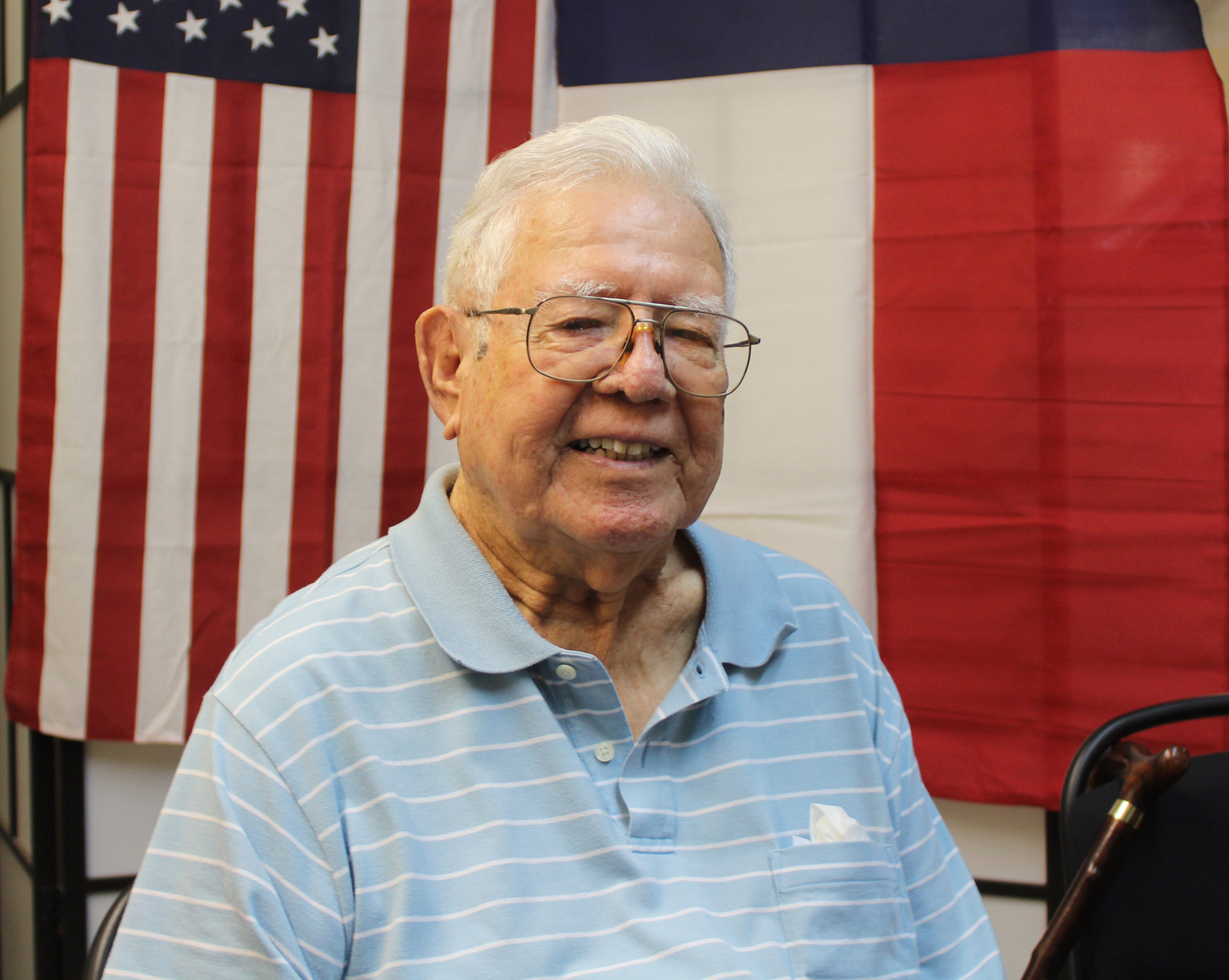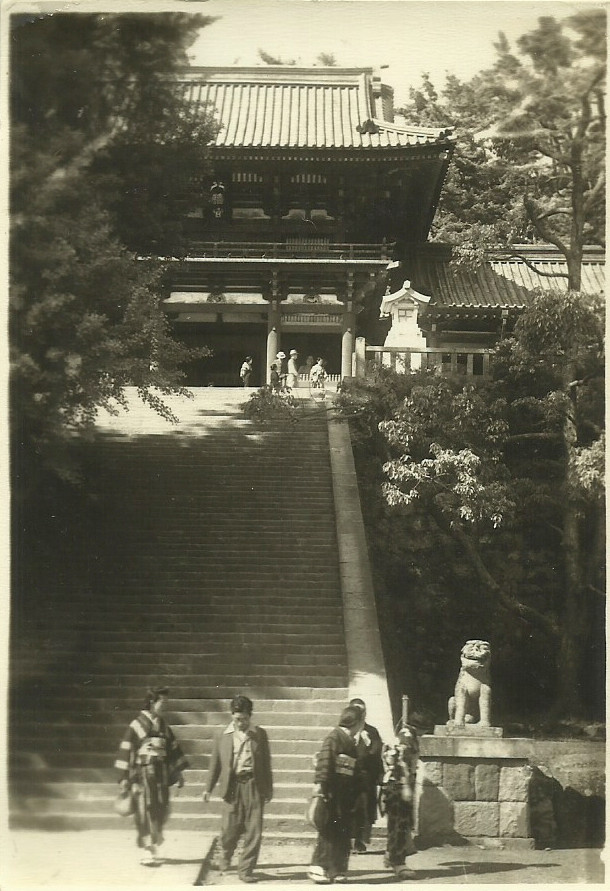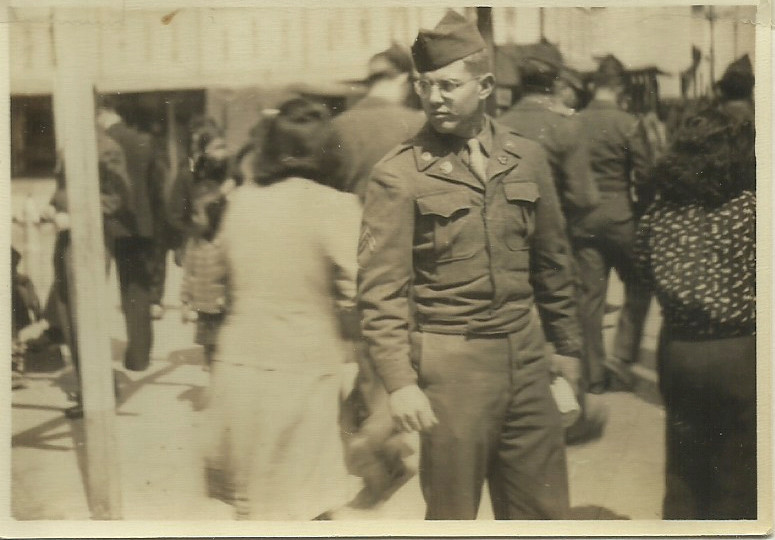Leon Netardus served in the occupation of Japan
Editor’s Note—this is another article in the series of stories about Gonzales men and women who served their country. If you would like to recommend another veteran who served for this series, please contact Publisher Terry Fitzwater at terry.fitzwater@gonzalesinquirer.com, or call 830-672-2861.
Almost everyone who lives in Gonzales County knows who Leon Netardus is. He is known as much for his 38 years of service at GVEC as he is known for being one of the area’s leading historians and thespians.
What many people do not know about is Leon’s service to his country. This is his story.
Leon Netardus was born on April 12, 1929 to Lydia (Skrehot) and August Netardus in Yoakum, Texas. The oldest of two sons (his brother Joseph was a veterinarian who was born in 1932), Leon spent his formative years moving with his parents as they struggled like most Americans in the Great Depression.
“Dad owned a grocery store, but a lot of people did not have money to pay with during the Great Depression so he closed the business,” Netardus said. “I was small and didn’t realize a lot of what was going on. We never had much so I didn’t really expect much back then. We moved a few times, until Dad found a job with Curtis Candy in 1942. That’s when we moved to Gonzales from Victoria.
“I guess in another 25 years, you might actually be able to call me a local,” Netardus added jokingly.
Netardus attended Gonzales High, where he lettered in football and basketball. He even tried out for track.
“There were 75 people in my graduating class, so there weren’t a lot of athletes,” Netardus said. “I went out for track one year, and they made me run the mile. Well, that was the end of my track career,” he laughed.
While in high school, Netardus had three routes delivering the Gonzales Inquirer newspaper on his bicycle.
“I made $17 a week, which was good money for a kid back then,” Netardus said. “I needed every dime of it when I went to college after the Army.”
Having been graduated in 1946, Netardus and his friend George Ritchie decided to join the United States Navy to take advantage of the G.I. Bill. They both signed up, a huge party was held in their honor, and then they both left to go for their Navy physical. Netardus failed the eye exam, and he was not allowed to join the Navy, which he felt crushed about. His friend George went off to serve in the Navy.
Leon did some odd jobs, including trying his hand at flying, before he joined the United States Army for an 18-month enlistment. The war had ended the previous September, but the military was offering benefits to go to college.
“I enlisted in the Army because I needed money to go to college,” Netardus recalled. “I wasn’t worried about going to war because it had recently ended, but I didn’t have a lot of alternatives.”
After enlisting at Ft. Randolph Field, Leon was off to Ft. Bliss in El Paso for basic training, then after finishing boot camp, he was shipped off to Ft. Stoneman in northern California to a replacement depot. After five weeks of washing pots and pans, doing KP [kitchen patrol] duty and other mundane Army tasks, Netardus’ outfit, the 1st Cavalry Division, 5th Regiment, shipped out for Japan on the General Hodges.
“The General Hodges was very cramped with over 2,000 GIs on it,’’ Netardus recalled. “It was an amazing site to sail under the Golden Gate Bridge leaving San Francisco, but I immediately got sea sick.”
The 12-day voyage took him to Yokahama, Japan, a city that had been devastated by the Army Air Corps bombings during World War II. Sailing up Tokyo Bay, Netardus said he admired the beauty of 12,000-foot cone-shaped Mt. Fuji, but was in for a surprise at the devastation that had rained down on Japan.
“The devastation was complete,” Netardus recalled. “There were burnt out buildings everywhere and massive piles of rubble. But let me say this: During the entire time I was there I never saw a Japanese citizen show one sign of disrespect for any allied soldier. Not one.”
During his stay in Japan, Netardus—who had been promoted to corporal after eight months of service—tried to see as much of the country as possible.
“I enjoyed Kamakura the most,” Netardus recalled. “Despite all the rubble and devastation, the Japanese train system was up and running and it ran on perfect timing. If we didn’t get a Jeep we would take a train.
“Kamakura was a beautiful seaside city, and there were lots of Shinto Shrines and even a massive Buddha that we could climb up. They are some of the fondest memories I have of my time in Japan.”
A couple of times during his stay in Japan, Netardus’ outfit was put on notice that they would be shipping out in one hour. Their destination: the Korean peninsula.
“That was the only time I got a little nervous, because we knew there were hostilities in Korea,” Netardus said. “When we got notice were going to be on the move, yes, I was a little scared.
“But then we would get the notice to stand down, and everyone relaxed. When the Korean war broke out, it was my old outfit they called up first and sent right into action.”
After 16 months, Leon was shipped back home on the Admiral Sims, and was quickly discharged from the Army. He got $97 for discharge pay.
“I had a couple of options to come back to Gonzales,” Netardus laughed. “One was a bus ride for $50 that took six or seven days. Another was a train ride for $70 that took five days. Then I went to the airport and found out I could fly directly into San Antonio for $97. I jumped on that airplane!”
Upon returning to his life in Gonzales, Leon enrolled in St. Mary’s College in San Antonio where he earned a BBA with a major in accounting.
“I did it in 3 ½ years to take advantage of the GI Bill,” Netardus said. “I lived in San Antonio, but even had to put some of my old newspaper savings into the fund. When I got out of college, I got a job at GVEC and I worked there for 38 years until Dec. 31, 1992.”
Along the way, Leon purchased his first car, a 1954 Mercury convertible that he saw in Las Vegas. “It was the same kind of car that Marilyn Monroe owned, so I had to have one too!”
About the time he purchased his flashy convertible, Leon saw a lovely lady at church who caught his eye. Her name was Rose Mary (Wroblesky) Butchek.
“I saw her sitting there, and I just had to meet her,” said Leon. “It was at St. James Church, and I’m sure I did not get in any trouble upstairs,” he joked.
Leon and Rose Mary were married on July 2, 1955. Rose Mary (whose previous husband had died in a car accident) had a daughter named Priscilla, and together the couple had a daughter named Janet. Priscilla Finch has three children of her own and Janet Flynt has two children of her own, making Leon and Rose Mary great grandparents five times over.
“We’ve had a good life,” Leon said on reflection. “After I retired, I volunteered at the chamber and now I give historic tours around Gonzales.
“Plus, I have worked in the local theater and even was in Bob Burchard’s play about the founding of Gonzales. I played Green DeWitt in Bob’s play, and I have performed at the Crystal Theater more than once. I enjoyed being in Bob’s production, because we not only performed that here every year during the Come and Take It celebration, but we performed at the Alamo, the University of Texas, in Houston and before the Daughters of the Texas Revolution.”
Comments












